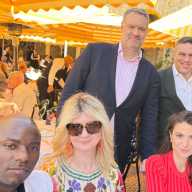The current exhibition at The Noguchi Museum, “On Becoming an Artist: Isamu Noguchi and His Contemporaries, 1922-1960,” gives a closer look at the relationships the artist had with many others.
Individuals from the fields of art, architecture, design and theater are part of the exhibition, which is being held to mark The Noguchi Museum’s 25th anniversary and will remain on display through April 24.
“In focusing on Noguchi’s collaborations with a great diversity of creative individuals, as well as institutions, ‘On Becoming an Artist’ will illuminate Noguchi’s truly protean creativity,” said museum director Jenny Dixon. “At the same time, it will provide a view of modernism that includes both well-known figures and those who have been overlooked in traditional histories.”
Noguchi was born in 1904 in Los Angeles. Although his mother was American, his father was Japanese so Noguchi also spent time living in Japan.
During his extensive career, Noguchi worked in many art forms, including sculptures, ceramics, set design and architecture. He also designed furniture, lighting and gardens.
Exhibition curator Amy Wolf explained that Noguchi was a free thinker who didn’t have the prejudices or value judgments that others in the art world might have had. Because of this, Wolf said he never thought something was worth less artistically because it was also useful.
“It allowed him to participate in so many areas,” she said.
Wolf began putting “On Becoming an Artist” together more than five years ago. While doing so, she said that the metaphor she was following was that of putting together a scrapbook of Noguchi’s life.
“I kind of wanted to bring together all sorts of materials that I felt were equally revealing,” Wolf said. “I felt that I could somehow create this picture of what his artistic life was like but also what the art world was like then.”
In addition to including artwork, the exhibit also features a variety of other materials, such as documentation, letters, exhibition catalogs and announcements.
“I would say the biggest surprise was how there wasn’t anything he didn’t touch,” Wolf said. “There wasn’t one artistic movement that he missed. He was just everywhere.”
Wolf said that, even today, nobody else can compare to Noguchi.
While putting together the exhibition Wolf said there were also some “fun surprises.” For instance, she saw a little drawing of a table Noguchi made with a friend and was then able to find the actual table. Wolf said that particular table was something the museum didn’t even know about.
While showing Noguchi’s work, Wolf said that “On Becoming an Artist” also has a human element to it that shows who he was as a person. She also said it illustrates how a person with very little money and no connections “can forge a successful and thoughtful life.”
“I think that can be a very inspiring message for people,” Wolf said.
Wolf said that one of the biggest impacts that Noguchi had was the idea that having an artistic object be useful added to its value.
“I think that idea and that concept is interesting and has bigger ramifications for other artists,” she said, adding that Noguchi also was willing to expand the definition of what sculpture was.
As part of the museum’s Second Sundays series, there will be several upcoming programs related to the exhibition. At 3 p.m. on February 13, art history professor Tom Wolf will present “Woodstock Artists’ Colony.” Noguchi created the sculpture “Death (Lynched Figure)” in Woodstock in 1934.
“South of the Boarder” will be held at 3 p.m. on March 13. James Oles will discuss, among other things, Noguchi’s mural techniques.
“INTERsections” will be held on April 10, also at 3 p.m. Artist Cary Leibowitz will lead an exhibition tour of “On Becoming an Artist.”
The Noguchi Museum, which was founded in 1985 and is located at 9-01 33rd Road in Long Island City, includes 10 indoor galleries and has an outdoor sculpture garden. It is open Wednesday, Thursday and Friday from 10 a.m. to 5 p.m. and Saturday and Sunday from 11 a.m. to 6 p.m.
General admission is $10 or $5 for senior citizens and students with a valid ID. It is free for city public high school students who have ID, children under 12 and museum members.
For more information, visit www.noguchi.org or call 718-204-7088.





























